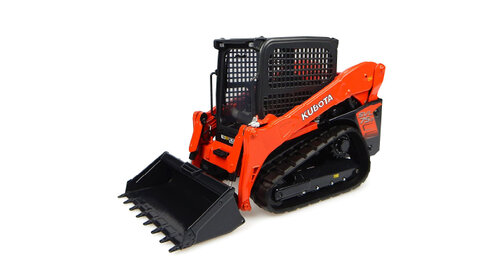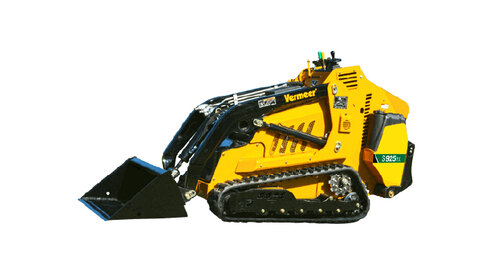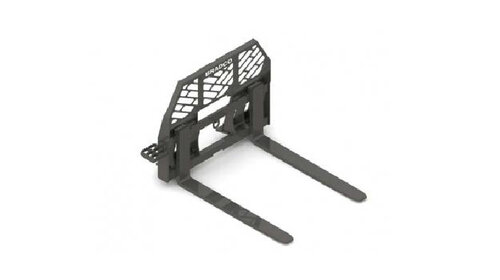At a first glance, a skid steer and a track loader can appear similar. Someone with an untrained eye might mistake them for the same thing. On top of their visual similarities, skid steers and track loaders serve many of the same functions. Either would be a worthwhile investment for your fleet. But there are important differences, and you should take time to seriously consider the pros and cons of each machine before you choose one or the other.
How Are Skid Steers and Track Loaders Alike?
In many aspects, skid steers and compact track loaders are identical. Both are built to be compact, move through tight spaces and have a small turning radius. Thatãs why you can find skid steers or track loaders on a wide variety of jobsites.
Both of them have a compact body with an attachment in front. Typically, the attachment youãll find is a bucket, but there are many other attachments available to replace it. Often, for compact track loaders and skid steers can be interchangeable, but refer to your for limitations.ô

What's the Difference Between Skid Steers and Track Loaders?
A skid steer differs from a track loader because of the wheels itãs equipped with. Skid steers are lighter because of their wheels. Since theyãre lighter than track loaders, they are easier to transport and store. The price of a skid steer is typically lower than the price of a track loader, so they are also considered the more cost-effective option.

Compact track loaders, abbreviated as CTL, have two sets of tracks on its undercarriage.
Typically, CTLs are equipped with rubber tracks. Some models might have steel tracks instead. Although they are more difficult to transport than their wheeled counterparts, CTLs have a smoother driving experience.
Which One Should You Choose?
The primary difference between skid steers and track loaders is how they move ã which is dictated by the environments they are used in. For example, the wheels of a skid steer are not suited for driving over uneven terrain or softer ground, where wheels can get bogged down or lose traction. Tracks, on the other hand, are very good at moving on mud or soil without suffering any damages.
Skid steers have the advantage on hard ground. They have a higher top speed and an easier time making tight turns and corners on concrete or asphalt. This is not the case for track loaders. Even a day or two of driving on hard ground could cause serious damage to the tracks.
Common Challenges With Skid Steers and Track Loaders
Maintenance
Skid steers and track loaders share a few challenges that are important to keep in mind. Naturally, the health and upkeep of a machine is a major issue. Most commonly, operators and fleet managers find themselves keeping a close eye on both the engine and the hydraulic system.
Machine owners need to make sure that mechanical problems are taken care of before they cause breakdowns and unplanned downtime. T3 is able to monitor a machineãs status and help you schedule necessary service.
Security
Security is an issue for anyone working on a jobsite. Both skid steers and track loaders are especially at risk. While their compact shape makes them versatile, it also makes them easier to quickly load onto a trailer and steal. Not all theft is so brazen ã some machines are ãborrowedã by unauthorized operators during project downtimes, using universal keys to drive machines and return them later. This microtheft costs the owner or renter fuel and possible equipment damage.
T3 can help you know exactly where your machines are at any given time and who is using them.ô Loss is just as common as theft, especially with that go with your skid steer or track loader. To account for loss, contractors sometimes include projected loss into every bid, making those bids less competitive. With T3-powered trackers, you can monitor the location of your tools and gear, all in one place.ô
°å¿ü¤Öêüë½ing vs. Buying Skid Steers and Track Loaders
Getting the right skid steer or track loader for your jobsite is about more than the right terrain ã it also has to fit your business. That means choosing between renting or buying, and each option has its advantages.
Owning
Owning construction equipment one clear advantage ã it will never be out of stock. While thereãs more of an upfront investment, and you are responsible for its maintenance and storage, an owned machine is yours. With skid steers and track loaders specifically, this is a very viable option, as both are dependable. Consider buying ô machines that you expect to use year-round or at the majority of your jobsites.
°å¿ü¤Öêüë½ing
°å¿ü¤Öêüë½ing from °å¿ü¤Öêüë½ has a lot of advantages. Itãs certainly the more cost-effective option in the short term. Plus, renting gives you a lot of control over when you use the machine. If you decide to rent, youãll only be responsible for a piece of equipment when youãre renting it. And with °å¿ü¤Öêüë½, you can easily off-rent a machine when the job is done. °å¿ü¤Öêüë½ing is useful for machines you only need seasonally or for a specific job. If you donãt typically work on soft ground, it might be a better idea to rent a CTL for one or two projects than buy one and keep it in your fleet to collect dust.
Even though these two machines look extremely similar, the choice is a lot more complicated. If youãre searching for a skid steer, track loader or any other piece of construction equipment, °å¿ü¤Öêüë½ has everything you need.

.svg)
.svg)











